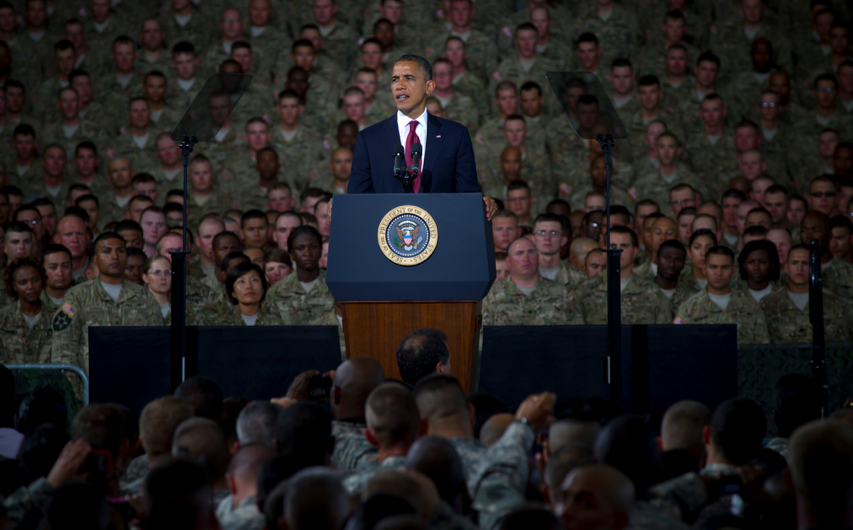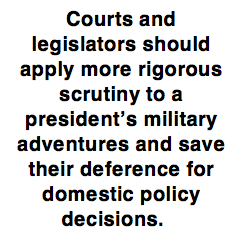When President Obama stood outside the Blue Room on September 10th to announce a major expansion of airstrikes in the Middle East, he explained that he had no other choice. The Islamic State in Iraq and Syria (ISIS), he warned, poses a threat to the entire region — including American citizens, personnel, and facilities. Without more bombs dropped, weapons supplied, and local fighters trained, the president said, ISIS could one day threaten the United States.
But while a show of “strength and resolve” was urgently required, one element of the new offensive was cast as discretionary: authorization from Congress. President Obama “welcomed” legislative support, not out of legal necessity, but as one might welcome an extra hand when moving a heavy couch. “I have the authority to address the threat from ISIL,” he said, using another name for ISIS. “But I believe we are strongest as a nation when the president and Congress work together.”
Presidents rarely extend such a generous invitation for congressional participation in decisions of war, preferring the flexibility of unilateral action provided informally by Congress — and sanctioned formally by federal courts — for generations. The presidents’ broad foreign policy prerogatives, though, are in stark contrast to the policymaking pattern in domestic affairs, where the executive’s agenda is so often stymied, undermined, and defeated by a hostile legislature.
This institutional arrangement is the opposite of what any rational system should require. Foreign policy — particularly when that policy is war — is too easy for presidents to enact, and domestic policy too hard. Courts and legislators should apply more rigorous scrutiny to a president’s military adventures and save their deference for domestic policy decisions.
Making Foreign Policy: An Executive Unbounded
President Obama’s disavowal of any obligation to consult with Congress before bombing ISIS is consistent with the long history of American warmaking. Just three years ago he commenced a military campaign against Muammar Gaddafi’s fighters in Libya, uninhibited by Congress’s silence. President Clinton bombed Sudan, Afghanistan, and Kosovo without any congressional authorization; President Reagan did the same in Libya and Grenada. These examples all post-date the War Powers Resolution of 1973, in which Congress briefly tried to claw back its institutional prerogative by imposing a sixty-day deadline on a president’s unilateral use of force. But presidents have shrugged off congressional deadlines as little more than a suggestion: President Obama’s action in Libya lasted seven months.
Although the Constitution specifically instructs in Article 1, section 8 that, “Congress shall have power to . . . declare War,” that power has sat idle, unused, and mostly unwanted — like an obscure knickknack from SkyMall — since Congress last formally made war in 1942 against Romania. The rare example of a president conditioning military action on congressional approval, as President Obama did in 2013 when considering attacks on Syria, was likely no more than clever political posturing, calling the bluff of Republican opponents who demanded American strength but lacked the resolve to supply it.
Despite the occasional grumbling from members of Congress, this institutional arrangement — the executive does everything; the legislature does almost nothing — persists with only the rarest interruption.
Making Domestic Policy: An Executive Diminished
Contrast the president’s discretion and autonomy in international relations with the polarized gridlock in domestic affairs, in which any semblance of lawmaking has been replaced by schizophrenic vacillation between paralyzed stasis and crisis-induced frenzy. Even annual budgets and mandatory debt payments are seemingly impossible to advance absent government shutdowns and credit downgrades.
After a successful reelection campaign, President Obama found that whatever political capital he had accrued with 332 electoral votes was not denominated in any currency accepted in Washington, DC. Major domestic initiatives, from immigration reform to gun control to environmental conservation, stalled, defeated by the Madisonian maze of veto gates. With the regular legislative process inoperable, the president has been forced to subsist on inadequate half-measures, such as executive orders and administrative regulations, to pursue the domestic agenda that voters endorsed.
In part, this frustration is by design. Federalist 51 extols a system where “ambition must be made to counteract ambition,” with federal powers separated, checked, and balanced. The Founders accomplished this by cracking the legislative authority into two branches, and cleaving it from the executive. Unfortunately, Congress diluted its own capacity for action further still, through a formal committee system and de facto supermajority requirements: in the Senate, an individual can kill most legislation through delay; in the House, bills are rarely considered without support from a majority of the members in the majority party.
As parties have become more ideologically homogenous, the window for functional lawmaking has shrunk further. Governing is seemingly possible only when one party controls government, or during the lame duck sessions when retiring or ousted congressmen seize one last chance to place practical problem solving above partisan showmanship. In the 2010 lame duck session, Congress passed a significant tax bill, food safety bill, and 9/11 first responders bill, repealed the military’s “Don’t Ask, Don’t Tell” policy, and ratified a nuclear nonproliferation treaty. Apparently exhausted by such productivity, the 112th Congress (2011-2012) set a record for fewest bills passed in the modern era — a record that the current Congress is on pace to shatter. A few post offices may be named and turkeys pardoned, but no one expects President Obama to enact additional domestic legislation of any significance before his tenure expires.
The Courts’ Contribution to Dysfunction
Exacerbating these problems, the full-bloom institutional imbalance we suffer today has been fertilized and maintained by 80 years of judicial mulch. The Supreme Court has feebly claimed it cannot impede the ever-expanding reach of the executive’s foreign policy power, while aggressively policing attempts to make domestic policymaking more functional.
The problem’s roots reach back to 1934, when Congress passed a joint resolution authorizing the president to prohibit weapon sales to Paraguay and Bolivia, and President Roosevelt issued a proclamation to such effect. When Curtiss-Wright Export Company was charged with violating the embargo, the company claimed that Congress had unconstitutionally “abdicated its essential functions and delegated them to the Executive” by passing the joint resolution. The Supreme Court acknowledged that such a grant of power from the legislature to the president may have been unlawful were it concerned with domestic policy, but decided that the executive possesses an arsenal of foreign powers beyond what is enumerated in the Constitution. Congress’s forfeiture of its own lawmaking power was upheld, and the Court named the “plenary and exclusive power of the President as the sole organ of the federal government in the field of international relations.”
After explicitly blessing such an expansive view of presidential power, the Court implicitly strengthened the executive further still by refusing to consider challenges to his authority. The legal basis of the Vietnam War was litigated at least 29 times, but the Supreme Court declined review of every case. In dissent from one such decision not to decide, Justice Stewart criticized the missed opportunity to resolve questions of “great magnitude.” “Is the present United States military activity in Vietnam a ‘war’ within the meaning of Article I, Section 8, Clause 11 of the Constitution? If so, may the Executive constitutionally order the petitioners to participate in that military activity, when no war has been declared by the Congress?” These questions would go unanswered, allowing the president to win by default.
By blessing Congress’s delegation of foreign policy power to the president, and then pleading helpless to enforce Congress’s attempt to repossess its constitutional authority, the courts have effectively established a one-way ratchet of ever-expanding presidential power.
In the domestic realm, meanwhile, the Court has pursued the opposite strategy.
Congress delegated power to the Attorney General, in a provision of the Immigration and Nationality Act, to allow individual immigrants who were subject to deportation to remain in the United States unless one house of Congress objects. When the House of Representatives passed a resolution in 1975 vetoing the Attorney General’s suspension of deportation orders for Jagdish Chadha, a Kenyan immigrant who had overstayed his student visa, Chadha challenged the law as unconstitutional. Even though this legislative scheme mirrored that in the War Powers Resolution (as Justice White noted in dissent), and even though both branches agreed to this scheme as a beneficial sharing of legislative and enforcement power, the Supreme Court struck it down. Unlike the war powers cases, where the Court so often declared itself powerless to intervene, here it lectured that “Resolution of litigation challenging the constitutional authority of one of the three branches cannot be evaded by the courts simply because the issues have political implications.”
In 1996 the legislature and executive again developed a plan to make policymaking more efficient. The Line Item Veto Act allowed the president to cross out individual provisions of appropriations bills, so that he would no longer need to veto entire legislation because of a few objectionable passages. But the Supreme Court disapproved, ruling the Act unconstitutional even though the Constitution does not mention the matter, since “constitutional silence on this profoundly important issue [i]s equivalent to an express prohibition”— the exact opposite reasoning as the Curtiss-Wright case. In dissent, Justice Breyer urged his colleagues to uphold the Act because the Court should “interpret non-literal separation-of-powers principles in light of the need for ‘workable government.’” Such pragmatic, efficiency-driven appeals only seem to resonate with the Court when it comes to international relations generally, and warmaking specifically.
As in the foreign policy context, federal courts can also facilitate dysfunction by deciding not to decide. Earlier this year, for example, a federal appeals court dismissed a constitutional challenge to the Senate’s filibuster rules, claiming it was powerless to adjudicate the controversy.
While these cases are driven by different facts and appeal to different Constitutional clauses, examine the pattern formed by the collective body of doctrine: Congress can give the president foreign policy power, but cannot take it back. Mutually beneficial interbranch compromises to make domestic policymaking more efficient are invalidated, and challenges to structural sources of gridlock are left unheard. The democratic process may be broken, but the undemocratic branch is at least partly to blame.
Why This Is A Problem
Justification for the current regime, whether supplied by judges, politicians, or academics, is often dressed in the language of legal mandates, but the underlying rationale is invariably policy-based. The president requires broad foreign policy latitude, as one congressman recently lectured, because “you can’t have 535 commanders in chief.” Domestic inertia, meanwhile, is praised for its “cooling saucer” effect on the people’s hot passions, as George Washington reportedly described the Senate to Thomas Jefferson.
But what if these concerns are backwards?
When 32,000 Americans are killed by firearms every year, how can we tolerate 535 gun control deciders in chief? With the national debt stretching fourteen digits, for how long can we survive 535 appropriators in chief? The President — the only politician elected with a national mandate — should have broad authority to implement a domestic agenda. His initiatives should at least be entitled to an up-or-down vote in Congress, and courts should provide room for more creative forms of flexible policymaking.
Otherwise, when government is too frozen and fractured to address the needs of its people, bad things happen. Civic institutions decay, social trust wanes, and we suffer the cynicism and pessimism that makes a healthy pluralism impossible. A nation that is incapable of addressing its people’s hopes and anxieties will stagnate economically, and collapse politically. Despite crumbing bridges and creaky railways that earned America a “D+” infrastructure rating; despite an immigration system and education system and tax system that virtually everyone recognizes as inefficient and ineffective; despite a public so fed up that Congress is rated less popular than cockroaches and traffic jams—we remain hopelessly stuck. There is little prospect for change we can believe in anytime soon, because our problem is not (only) corrupt leaders in government, but an unworkable system of government that makes much needed domestic reform all but impossible.
In foreign policy, on the other hand, gridlock and stasis provide a healthy default. It is this realm that the fiery emotions of fear, anger, and vengeance are most in need of a “cooling saucer,” a structurally-imposed brake. We should only meddle outside our borders when there is a clear, formal domestic consensus. Declaring a war should be the hardest thing for a government to achieve — harder than giving people healthcare or addressing a border crisis — because the consequences are more complex, and beyond democratic redress. If an executive wants, for example, to make soda illegal (or free), that authority can be accommodated with little danger because disapproving voters can more easily restore the previous policy by electing a new leader. Once a president starts bombing another country, though, that egg is cracked — as we have seen, a newly elected president could not put Iraq back together again.
To be clear, the problem is not with one commander making strategic decisions in the field — whether to bomb this town or that town. But we should want a majority of the people’s representatives agreeing that we should be bombing any towns in the first place. If an executive wants to send Americans to war, he should need to endure the difficult, slow process of currying support in two houses of Congress. It is no excuse that the president must sometimes respond immediately to imminent threats or narrow opportunities: the War Powers Resolution provides such authority. There is simply no reason to tolerate a system where the president gets to bomb foreign countries for more than 60 days — with all the messy, unforeseeable consequences that can produce — when most people think the war is wrong. Unlike domestic policy, these decisions are much more likely to be irreversible, which is why the strong presumption — absent democratic consensus, expressed through a congressional vote — should be inaction.
A functional government should be capable of sanding the contours of domestic society to make life smoother for its citizens, and it should engage the broader world deliberately, with sober caution. Far from this ideal, the United States government sits like a busted jalopy in domestic affairs, with an engine capable only of the occasional cough and lurch. Waging war, meanwhile, remains far too easy.
Fashioning a more effective model of powers and restraints will require new habits of deference and scrutiny from policymakers and courts. Members of Congress should loosen the supermajority requirements and rigid committee system that effectively suffocates popular legislation, and judges should respect creative compromises between the two branches that add flexibility to the policymaking process. When the president calls for war, however, legislators should jealously guard their institutional prerogative, and the judicial branch should rediscover its essential function as guardian of the law. Only then might we achieve a government capable both of “provid[ing] for the common defense” and of “promot[ing] the general welfare”— the very promises our founding document was intended to secure.

Photo Source here.



